
NO WOMEN OR MINORITIES-This June 3, 1992 photo shows Arkansas Gov. Bill Clinton, right, playing the saxophone with the band during the musical opening of “The Arsenio Hall Show.” (AP Photo/Reed Saxon, file)
by Lynn Elber
LOS ANGELES (AP) — The role of female talk show hosts in late-night TV broadcast network history, all 50-plus years of it, can be summed up in two words: Joan Rivers. It takes just another two — Arsenio Hall — to do the same for minorities.
There’s no indication that’s going to change in the latest round of musical chairs involving “Tonight” and “Late Night.” All the NBC, ABC and CBS showcase jobs at 11:30 p.m. Eastern and later appear likely to remain securely in white men’s hands.
Jay Leno is handing off to Jimmy Fallon, with speculation tagging Seth Meyers as his likely successor. Meanwhile, David Letterman, Jimmy Kimmel, Craig Ferguson and Carson Daly are sitting pretty, without the faintest drumbeat of a pair of advancing high heels to signal a threat.
There have been alternatives bandied about — Chelsea Handler, black comedian-writer Aisha Tyler — but no hints they or others are getting traction.
“In real life it seems to me that women have definitely shown themselves to be able to carry on a conversation,” said Merrill Markoe, the Emmy Award-winning writer who helped David Letterman create “Late Night” at NBC. “Women have exhibited an interest in talking for centuries. I’m not sure how it is that no one has seemed to notice.”
NBC did not respond to requests for comment on the issue. But if belles du jour Tina Fey and Amy Poehler can excel at TV sitcoms and movies and teach Ricky Gervais a thing or two (or three) about hosting the Golden Globes, could they be queens of the night with their own talk shows? Or maybe a Hispanic or Asian-American man could have a turn. We may miss out on a “Jimmy Kimmel Live” clip of a heavyset woman lifting her T-shirt, and the host then warning us, “I need to take a break. I’m going to throw up,” but we might get other thrills.
Women and minorities have conquered other traditionally White male-dominated arenas, on and off TV — think anchorwoman Diane Sawyer, President Barack Obama — but in late-night even daring cable is content with the homogenized likes of Conan O’Brien, Jon Stewart and Stephen Colbert, with such occasional dashes as E!’s Handler, BET’s Mo’Nique and TBS’ now-gone George Lopez thrown in.
Rivers, who became host of Fox’s “The Late Show” in 1986 after filling in as the sole regular guest host on Johnny Carson’s “Tonight,” calls the lack of female hosts “beyond” frustrating.
Blame the broadcast industry’s resistance toward change and the risk of failure, she said: “Everybody is running so scared, and has always run scared.”
And executives can find reasons, or excuses, for keeping the status quo.
“They had surveys at NBC, and the surveys were that women would rather watch a man at night, which is what they’re always throwing up in your face,” Rivers said.
That’s an argument that’s still made, privately, in the industry: Women want to hear their pre-bedtime monologue jokes from a man, while Oprah Winfrey, Ellen DeGeneres and Katie Couric are welcome in daytime.
It’s true that women make up a majority of the audience for every network late-night show. ABC’s Kimmel, for instance, is averaging 1.4 million female viewers and 770,000 male viewers this season, while Leno is watched by 1.9 million women and 1.5 million men, according to Nielsen Co. ratings.
